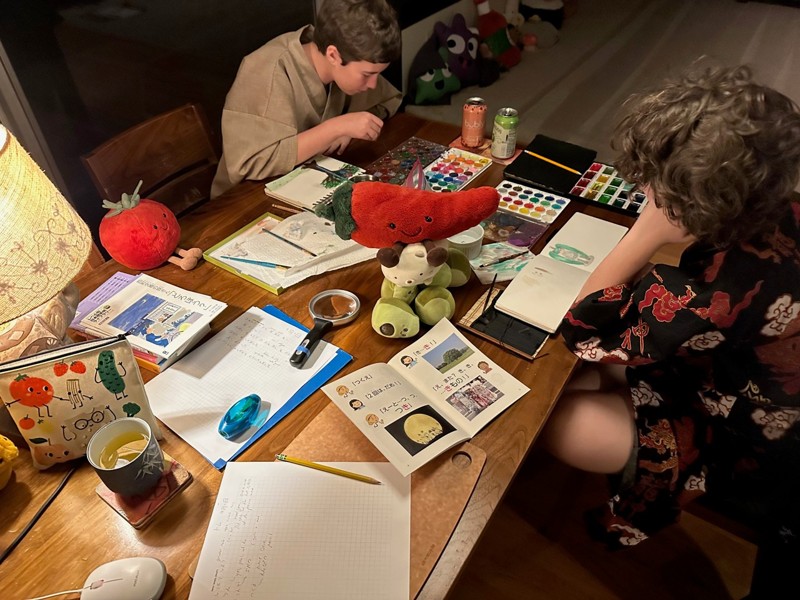Have I Taught My Children Anything?
Note (09/13/2023): I missed one! It'll be in red below.
During a recent trip to New England, I was privy to a conversation in which a husband & wife were asking their three kids for examples of "Things that dad has said that fall under the rubric of 'fatherly wisdom', and/or was a type of a lesson or guidance", and on my cross-country plane ride home, I had a lot of time to think, and so I began to wonder:
I wonder what my own kids would say if I asked them this?[1]
A few days later we had a "creativity night[2]", during which (a) they were painting with watercolors (b) I was studying Japanese (にほんご を べんきょう していました!) and (c) we were listening to Nocturnes, by Chopin. The mood was lite, we had a pile of stuffies on the table: the time seemed right .. and so I asked the very same question.

This seems like a pretty good start to me, though I'm sure we forgot some of them (which is sort of the point here: which ones were easy to remember?)
(Note that these are in no particular order)
- You can't make people behave in a certain way. You can't control people. You can't *make* people do certain things, nor believe certain things. The best you can do is to lead by example and hope for the best (and cross your fingers). That's [literally] all you can do.
- Other people don't make you mad, you choose to get mad (read: we're in control of our own emotions and have the freedom to choose to react in many different ways during any given situation)[3].
- Keep your sense of humor as you get older (E.g.: kids love the rain but adults just complain about it endlessly). There seems to be a general trend of adults getting crustier and crustier as they get older, and to be wary of this happening to you.
- If you're putting off a task or something, there really is no better time than now to do it (from The Power of Now by Eckhart Tolle).
- The definition of a friend is: anyone who makes optimistic assumptions about me (note just how much this expands the traditional definition).
- The negative qualities we point out in other people (and mercilessly judge them for) are most likely things we see in ourselves that we don't want to acknowledge (so be careful).
- The American diet is what’s making everyone sick, mostly due to sugar and high glycemic carbs (aka: sugar).
- The real reason people in society are obsessed with pointing out flaws in other people is to keep the spotlight off of themselves (we're all afraid that the spotlight will be shined on us, revealing our own character flaws).
- When people use phrases like “our un-housed neighbors” (to refer to homeless people), they’re trying to control the only thing they can about homelessness (the language they use to describe it), as they’re powerless to change the actual situation. This happens all the time[4].
- It is the nature of _____ to _____. (Milk to spill, cars to get scratched, a glass to fall off of the counter and break, etc). If you try to resist these things, or they upset you terribly, you’re going to have a bad time.
- Be deeply skeptical when someone tells you a certain word is no longer to be used. Who decided this, and why? What words are next? Why word A and not word B? Do I (you) get a seat on the committee of “right speech”? (The same people who want to ban certain words will swing to the opposite side when someone comes along to ban one of “their” words).
- Being smart is a double-edge sword: on the one hand, it's beneficial to be bright (so you can figure things out), but smart people are also the only ones who have a sense of just how much they don't know, and this has the effect of making you feel dumb (while the dumb people walk around feeling quite sure that they know everything).
- No matter how much you love someone, no matter how much warmth and affection you show them, how much kindness: it doesn't mean they're going to love you back[5], and in fact, they might even hate you.
- You can't believe anything you read on the Internet (aka: please think critically)[6].
- If you're doing something radically different from everyone else (e.g.: solving a problem in an incredibly novel and unique way), you're either a genius or a moron, and there's nothing inbetween.